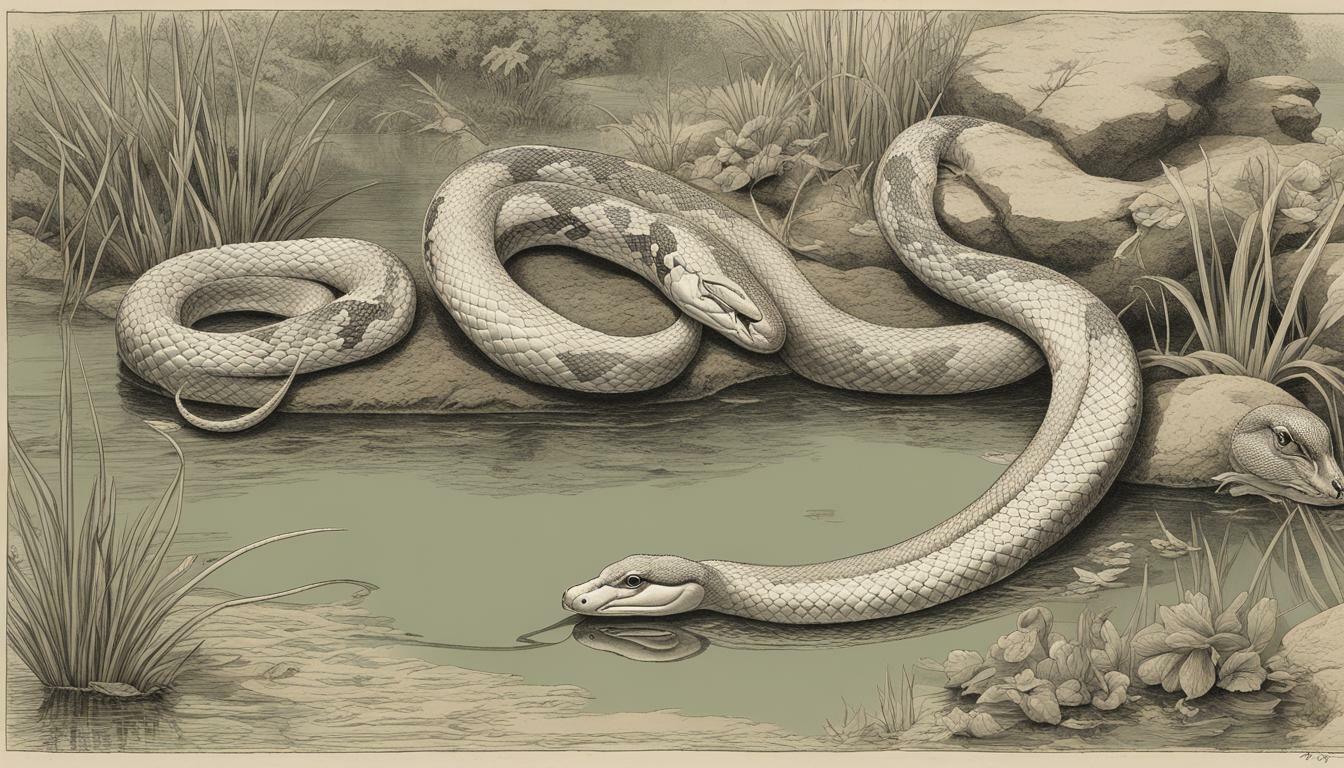Do Snakes Eat Ducks? Unveiling a Reptile’s Diet

Table of content:
- What Types of Snakes Eat Ducks?
- How Do Snakes Catch Ducks in Water?
- Can Pet Snakes Eat Ducks?
- Do Water Snakes Eat Baby Ducks?
- Why Do Snakes Go After Ducks?
- What Snakes Are a Threat to Ducks?
- Do Rat Snakes Eat Duck Eggs?
- How Do Ducks Protect Themselves From Snakes?
- Do Corn Snakes Eat Ducklings?
- Are Ducklings Safe From Snakes?
- Final Thoughts
Snakes eating ducks is a relatively common occurrence in nature. As predators, snakes will hunt and consume ducks and ducklings for sustenance. However, not all snakes pose a major threat to ducks. The types of snakes that are most likely to prey on ducks, how snakes catch ducks, and whether pet snakes can eat ducks are important things to understand.
What Types of Snakes Eat Ducks?
Certain snake species are more prone to feeding on ducks due to their size, hunting behaviors, and habitat. The types of snakes most likely to eat ducks include:
- Water snakes – Water snakes such as northern water snakes, brown water snakes, and diamondback water snakes frequent aquatic environments. This makes ducks and ducklings vulnerable as prey.
- Garter snakes – Though small, garter snakes are opportunistic predators that will eat ducklings and eggs.
- Rat snakes – Excellent climbers, Rat snakes raid bird nests for eggs and young. Duck eggs and ducklings can become victims.
- Kingsnakes – These constrictors will take ducklings and occasionally adult ducks.
- Racers – Fast-moving racers hunt in wetlands and can grab ducks in the water or on land.
- Cottonmouths – Found in southern wetlands, cottonmouths will eat juvenile and adult ducks.
- Pythons – Large constricting pythons such as Burmese pythons and reticulated pythons can consume adult ducks.
Snakes that eat fish and frogs, such as water snakes and garter snakes, are most likely to prey on ducks. Snake species that climb, like rat snakes, raid nests. Larger constricting snakes pose a threat to grown ducks.
How Do Snakes Catch Ducks in Water?
Snakes employ different techniques to catch ducks in lakes, ponds, wetlands, and other aquatic environments:
- Stealth ambush – Water snakes and cottonmouths will lay motionless in wait for ducks to approach. When close enough, they strike out and grab the duck, envenomating or constricting them.
- Open water pursuit – Racers and other quick swimming snakes will chase down ducks in open water, seizing them in their jaws once within range.
- Edge ambush – Snakes lurk at the water’s edge, remaining hidden in vegetation. They snatch low-swimming or young ducklings passing by the shoreline.
- Nest raiding – Rat snakes and other climbing/burrowing snakes will infiltrate duck nests on land or in tree hollows near water to eat eggs and young ducklings.
- Wading – Smaller snakes, like garter snakes, slip into the water and stealthily approach and grab swimming ducklings.
A duck’s most vulnerable position is when sitting on the water or shoreline as snakes employ ambush and edge tactics. Swift pursuit in open water or nest raids also leads to snakes catching ducks.
Can Pet Snakes Eat Ducks?
It is not advisable to feed ducks or ducklings to pet snakes for a few important reasons:
- Protein levels – Ducks have lower protein levels compared to rodents. This can lead to malnutrition in snakes fed whole duck diets.
- Difficulty digesting – Pet snakes may have trouble properly digesting feathers, bones, and other duck body parts. This can cause impaction.
- Parasite risk – Ducks carry parasites like gastrointestinal worms that can transfer to pet snakes and cause illness.
- Zoonotic diseases – Ducks may transmit bacteria like Salmonella to snakes, which can spread to humans. Close contact should be avoided.
- Ethical concerns – Killing ducks to feed snakes raises ethical issues for some pet owners regarding proper snake food sources.
For these reasons, it is best to stick to feeder rodents obtained from reliable, ethical sources to meet pet snake dietary needs. Talk to a qualified herpetologist or veterinarian before considering feeding ducks.
Do Water Snakes Eat Baby Ducks?
Yes, water snakes do prey on baby ducklings and are a danger to them, especially in their first few weeks of life.
The main reasons water snakes eat baby ducks include:
- Vulnerability – Ducklings cannot fly, dive, or defend themselves well in their early stages. This makes them easy targets for water snakes.
- Hunting proximity – Water snakes share the same aquatic habitat as ducklings, allowing them frequent opportunities to hunt.
- Duckling size – Small duckling bodies are the right size for water snakes to swallow whole.
- Abundance – Female ducks have between 5 and 15 ducklings per brood, increasing availability.
Water snake species known to eat ducklings include diamondback water snakes, northern water snakes, and brown water snakes. Ducklings are also taken by garter snakes if encountered near water edges.
To improve duckling survival, experts recommend keeping broods closer to shore cover and away from dense vegetation where snakes ambush.
Why Do Snakes Go After Ducks?
Snakes are predators, so they will go after ducks for a few key reasons:
- Food source – Ducks provide a high-protein, meat-based food source for snakes. Adults and ducklings can sustain snakes.
- Convenience – In shared wetland habitats, ducks are an easily accessible food item for snakes to hunt.
- Vulnerability – Ducklings and molting adults are vulnerable prey, giving snakes an advantage in attacking them.
- Taste – Snakes may find the taste of duck eggs, ducklings, and adult ducks to be favorable as food items.
- Hunting instinct – Catching ducks satisfies a snake’s innate predatory drive and hunting behaviors.
By going after ducks, snakes are able to fulfill nutritional needs while acting on hunting instincts. Ducks frequenting aquatic snake environments will naturally become prey items. However, snakes do not hunt ducks exclusively, taking fish, frogs, rodents, and other prey.
What Snakes Are a Threat to Ducks?
The snake species that pose the biggest threat to ducks based on size, hunting habits, and habitat include:
- Cottonmouth – Aggressive ambush predators in southern wetlands that eat juvenile and adult ducks.
- Water Moccasin – Another name for the cottonmouth, these venomous snakes consume ducks.
- Northern water snake – Abundant large water snake that feeds on ducklings and eggs.
- Diamondback water snake – Smaller water snake that takes ducklings near water edges.
- Brown water snake – Medium-sized water snake that frequents ponds and lakes where ducks reside.
- Racer – Fast-moving with a varied diet, racers will snatch ducks on land and in water.
- Kingsnake – Constrictors that raid nests for eggs and take ducklings.
Any large snake that shares territory with ducks can become a predator threat. But the ones most likely to feed on ducks are water snakes, racers, constrictors, and venomous cottonmouths that live alongside them.
Do Rat Snakes Eat Duck Eggs?
Yes, rat snakes are well known for eating duck eggs when they come across nests. A few reasons why rat snakes eat duck eggs include:
- Protein – The eggs provide an excellent source of protein to sustain rat snakes.
- Nest raiding – Rat snakes are adept climbers that will infiltrate nests in trees, on the ground, or in cavities.
- Egg size – Duck eggs are smaller than goose eggs, making them easier for rat snakes to swallow whole.
- Availability – Duck nests containing between 5 and 15 eggs are plentiful in spring, giving rat snakes opportunities.
- Prey drive – Rat snakes have strong predatory behaviors leading them to seek out and consume eggs.
Rat snakes play a role in natural selection by taking duck eggs. However, overraiding by rat snakes can reduce duckling numbers and reproductive success. Property owners sometimes eliminate rat snakes to reduce damage. Excluding rat snakes from nest sites is a non-lethal approach.
How Do Ducks Protect Themselves From Snakes?
Ducks have some defensive behaviors and traits that help protect themselves and their young from snakes:
- Nesting off the ground – Ducks often nest in tree cavities or elevated nest boxes that snakes can’t easily access.
- Mobbing – Adult ducks may swarm or repeatedly dive bomb snakes to drive them away from nests or young.
- Leading snakes away – Hen ducks might feign injury to lure snakes away from their brood.
- Group swimming – Ducklings stay close together and near adults for safety in numbers while swimming.
- Hiding in vegetation – Ducklings will take cover in dense water plants to conceal themselves from snakes.
- Aggression – Male ducks are very territorial and will chase away snakes that get too close.
- Flying escape – Adult ducks can escape snakes by flying away, something ducklings cannot do until grown.
Though not always successful in evading snakes, these behaviors contribute to ducks’ defense against them.
Do Corn Snakes Eat Ducklings?
While not their primary prey, corn snakes do occasionally eat young ducklings if they are able to catch them. Here’s why corn snakes may feed on ducklings:
- Opportunistic nature – Corn snakes will eat small animals they can overpower, including young ducks.
- Habitat overlap – Living in wet areas raises the chances of encountering ducklings.
- Hunting capability – Corn snakes are adept climbers and swimmers to raid nests and grab ducklings.
- Prey size – Ducklings fit the size profile of prey corn snakes can swallow whole.
- Availability – High numbers of ducklings improve the odds of corn snakes finding them.
However, corn snakes feed primarily on small rodents and birds. They do not hunt ducklings exclusively. Given the choice, cornsnakes seem to prefer mice, rats, and eggs over ducklings. Still, duck owners should be aware of the potential risk corn snakes can pose to ducklings.
Are Ducklings Safe From Snakes?
Ducklings face high predation risks from snakes, especially in their first couple weeks of life. The biggest threats are:
- Water snakes in shared aquatic habitats.
- Garter snake’s proximity to nests near water.
- Rat snakes raiding ground and tree nests.
- Raccoons along with snakes eat eggs and young.
To improve safety, experts recommend:
- Elevated and protected nesting spots away from dense vegetation.
- Keeping ducklings close to adults and shoreline when swimming.
- Housing ducklings safely indoors at night when most vulnerable.
- Using predator-proof fencing around pond areas.
- Eliminating places where snakes hide and nest near duck habitat.
With precautions, duckling casualties to snakes can be reduced. But snakes play an important predatory role in the ecosystem. Some loss of ducklings is inevitable for overall balance.
In wetland areas, interactions between snakes and ducks frequently occur. Certain snake species prey actively on ducks, especially vulnerable ducklings. Snakes are drawn to eating ducks for sustenance and to satisfy innate hunting drives. Ducks have evolved some defensive measures, but snakes remain a significant threat. While difficult to prevent all snakes from preying on ducks, certain actions can improve duckling safety. Snake and duck dynamics will continue, as they play out important roles in natural ecosystems.
Final Thoughts
Snakes preying on ducks are part of the natural order of wildlife food chains. While ducks can be negatively impacted, snakes fill an ecological role. By better understanding which snake species pose the most risk, and taking appropriate precautions, duck enthusiasts can reduce potentially excessive or harmful predation. With some wise management, snakes and ducks can continue living alongside one another as they have for ages.
Welcome. I’m Adreena Shanum, the proud owner of this website, and I am incredibly passionate about animals, especially poultry. I founded adreenapets.com as a labor of love, stemming from my desire to share my knowledge and experiences with poultry enthusiasts worldwide.




